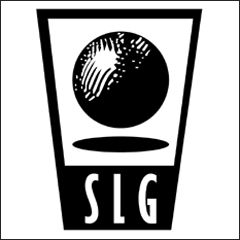SLG Publishing has been a major part of the American comics industry, helping to usher in notable creators like Charles Soule, Jhonen Vasquez and Jim Rugg. But for the past few years the publisher has been struggling.
Founder Dan Vado has been public about the company's financial status, turning to crowdfunding platforms for help in keeping the business afloat -- but with little success. He organized two unsuccessful Kickstarter campaigns in 2012, and returned this year, first with a GoFundMe effort and now with Patreon.
While none of the campaigns have reached the stated goal, Vado remains hopeful. The comics industry has witnessed numerous successful crowdfunding campaigns (even on a publisher level, such as with Fantagraphics), but SLG's plight underscores that, unfortunately, they don't all work out that way. But what's so different about SLG's situation?
"Years of running a for-profit business as if it were a non-profit, SLG made its own name by investing in unknown creators and giving them an opportunity to shine on their own with little editorial interference and shielded from the harsh economic realities of the publishing world," Vado writes on his Patreon page. On the GoFundMe page, he talks about the economic realities he's faced as a comics publisher, citing "a perfect storm of bad luck, bad economy and, yes, bad decisions" that has left SLG Publishing "on a terrible financial footing."
Vado launched SLG Publishing (then Slave Labor Graphics) in 1986 as a superhero publisher, but quickly found success with such offbeat comedy as Johnny the Homicidal Maniac by Jhonen Vasquez and Milk & Cheese by Evan Dorkin. While quite different from superhero books on which Vado based his company, these titles sat firmly outside the mainstream of specialty shops but found an audience through alternative outlets. However, in ensuing years, SLG couldn't seem to duplicate those successes -- not even following a partnership with Disney.
In 2009 Vado came to the realization that SLG wasn't bringing in enough income to give himself a salary, leading him to open an art/music storefront. However, that drew him away from comics, as he explored other ventures, including a record label, a tiki-themed book publishing company and a jazz concert series. The day-to-day business of SLG was left to longtime Editor-in-Chief Jennifer de Guzman, who departed in 2012 for Image Comics. Since then, SLG's publishing output has declined sharply from its heyday of the late 1990s.
Of the three earlier crowdfunding efforts, only GoFundMe ended up generating money for SLG -- $13,100 of an $85,000 goal, which Vado said "did go a long way to helping us get through some short-term issues." The Patreon campaign, launched earlier this month, has garnered pledges of $74.50 per month, but the goal is a minimum of $8,500 per month to pay for his commercial space and staff. Donations don't go strictly to SLG Publishing, but will be spread to Vado's other ventures as well, including the Alternative Press Expo.
"There are a number of expenses on a monthly basis which go along with running a full-time business, be it comics, music venue, art gallery, or what-have-you," Vado states on Patreon. "Because we have, for the most part, stayed true to my original vision of giving new people an platform to shine on the potential for projects like new comics is somewhat long-term. So we will be using the money contributed here to help pay rent, utilities and payroll for our small company so that we can continue to invest our time and energy into introducing the world to new talent, be they comic artists, musicians or fine artists. In addition to funding our publishing activities, getting funding through Patreon will allow us to add additional staff to help run APE in 2015."
It was announced last month that Comic-Con International had returned APE to Vado, who founded the convention in 1994 as a showcase for alternative cartoonists, self-publishers and indie publishers. He explained on his website that Comic-Con organizers "never made any money running APE," and offered to return it to him at no charge. As he assumes control, he's making several major changes to the festival, including bringing it back to its original home of San Jose (the show had been held in San Francisco since 2000) and diversifying the event so that it's about more than comics.
“A few years ago, I thought this was kind of sucky. I really wanted APE to be all about comics," he tells Publishers Weekly. "But now, it's really about expression -- maybe the 'E' in APE is about expression. I can't say it's a good or bad thing, but we'll definitely have it continue as the show evolves."


